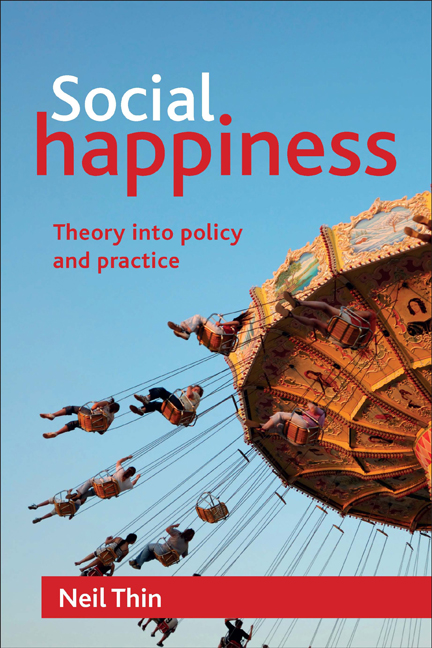sixteen - Geronto-eudaimonics: late-life thriving for all
Published online by Cambridge University Press: 01 September 2022
Summary
There may come a time when not being able to run a marathon at age five hundred will be considered a profound disability. (Harris, 2010, p 14)
Valuing and sustaining the late-life bonus
Of all the global social experiments we’ve reviewed, none raises more interesting and challenging happiness questions than our unprecedented experiment in life extension. Even if much of happiness scholarship appears simply to rake over age-old conversations about the good life, the same could not possibly be said for geronto-eudaimonics, the study of happiness in old age. This has been one of the richest and most inspiring veins of happiness enquiry, because the mass-scale enjoyment of old age is a radically new invention. Traditionally, most gerontological research has been pathological (Bowling, 2007, p 2; Stirling, 2010, p 4), although there have been many significant exceptions, building up to a clear recent trend towards positive and balanced approaches (see for example the readings at the end of this chapter).
The late-life bonus is one of modernity's greatest gifts, even if it also poses the difficult new ethical and practical challenges that still dominate much research and policy discourse on the ‘burden’ of expanding populations of old people. Cultural life-course maps and visions of the good society or the good life that don't assume a large percentage of the population over 65, and that don't assume that individuals should expect to live into their 80s, are already outdated. The life-expectancy revolution has been one of the most persuasive drivers of happiness scholarship and of happiness policy experimentation. For the first time in human history, it now seems possible that the majority of humanity can live for several decades beyond the end of their child-rearing years, and not only that but live well in communities and networks of peers who can all enjoy the greatly expanded life-style opportunities of the modern age. Cross-cultural gerontological studies of the possibilities for successful (and unsuccessful) ageing are among the most promising contributions of happiness studies to social development policy.
- Type
- Chapter
- Information
- Social HappinessTheory into Policy and Practice, pp. 223 - 234Publisher: Bristol University PressPrint publication year: 2012

